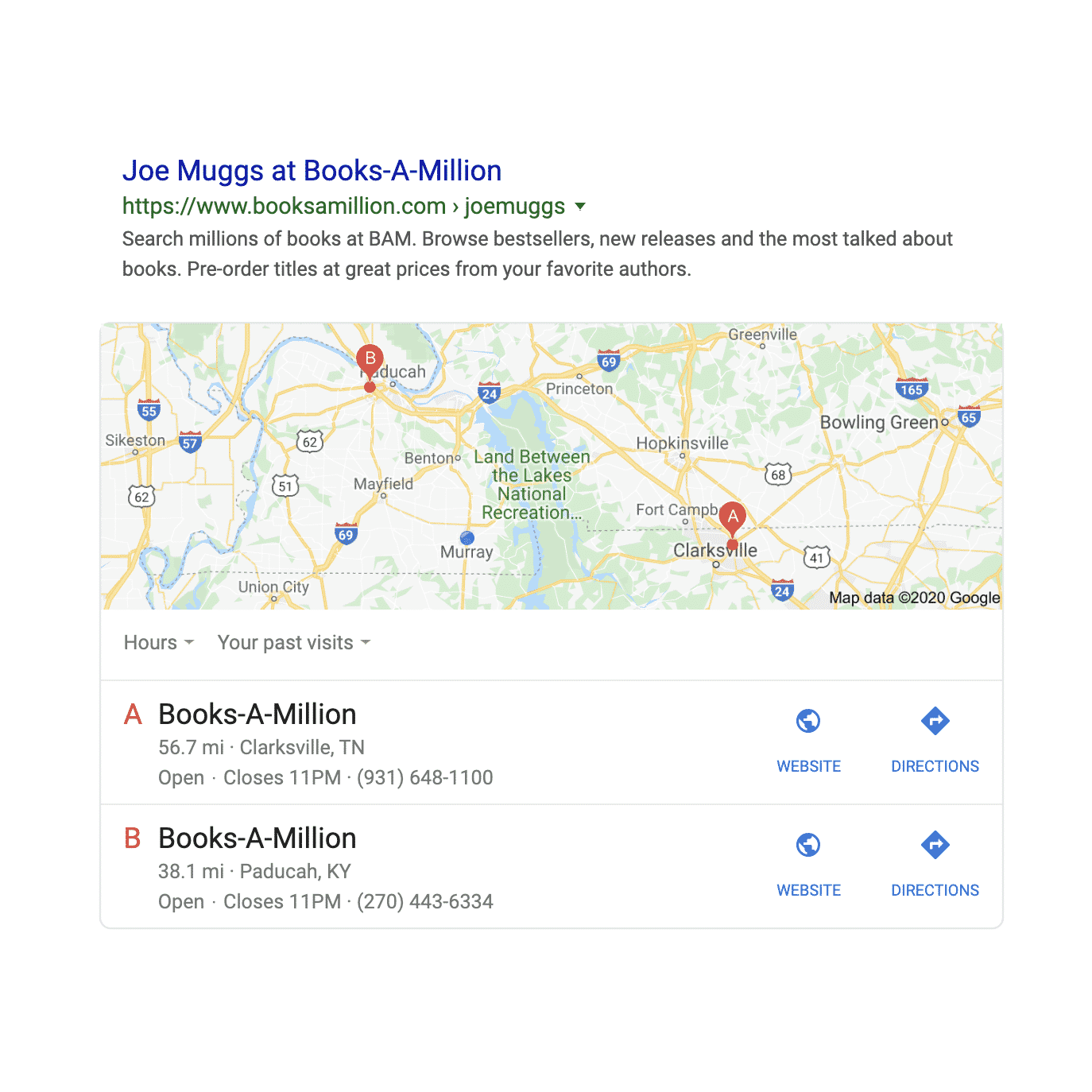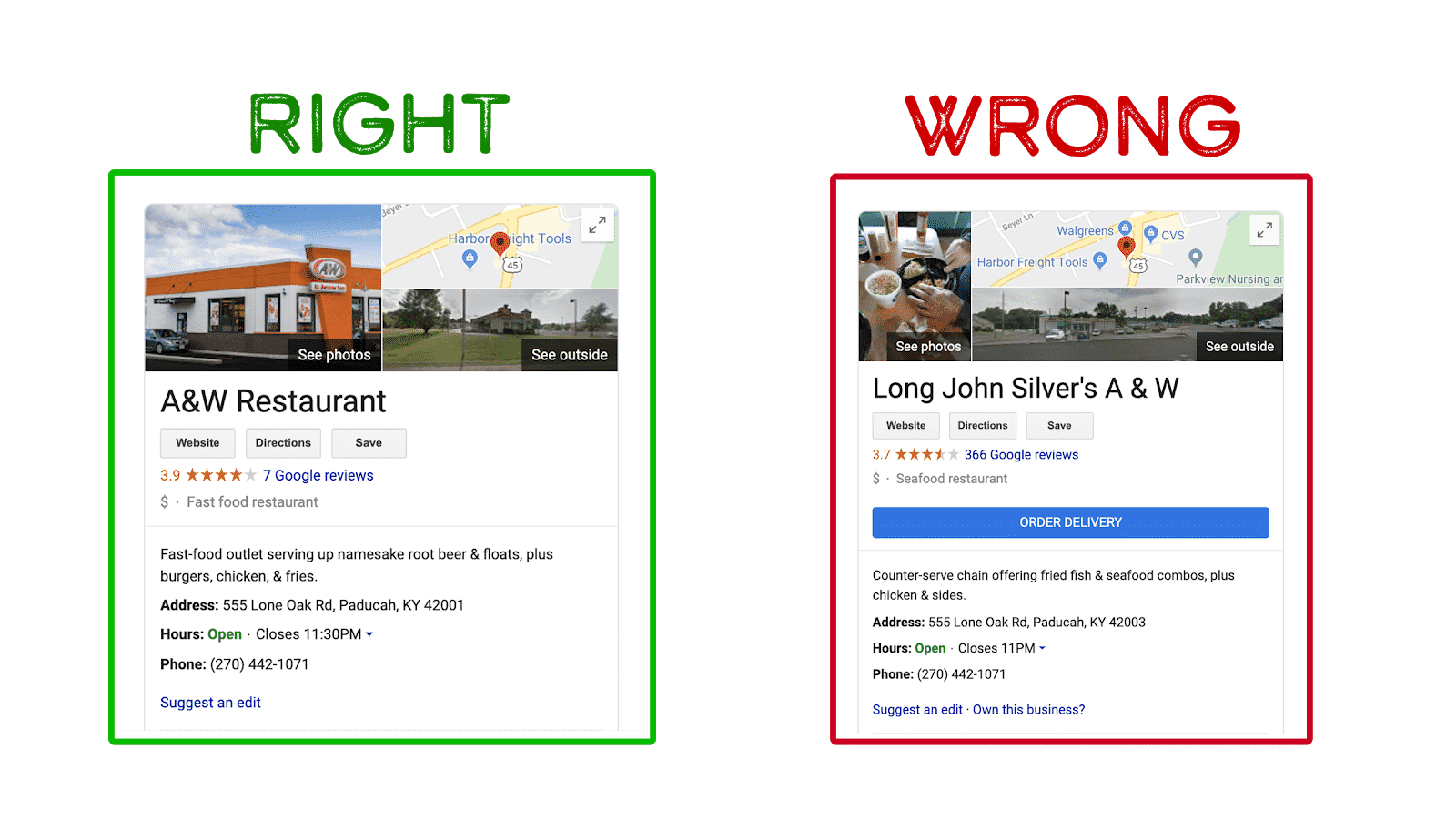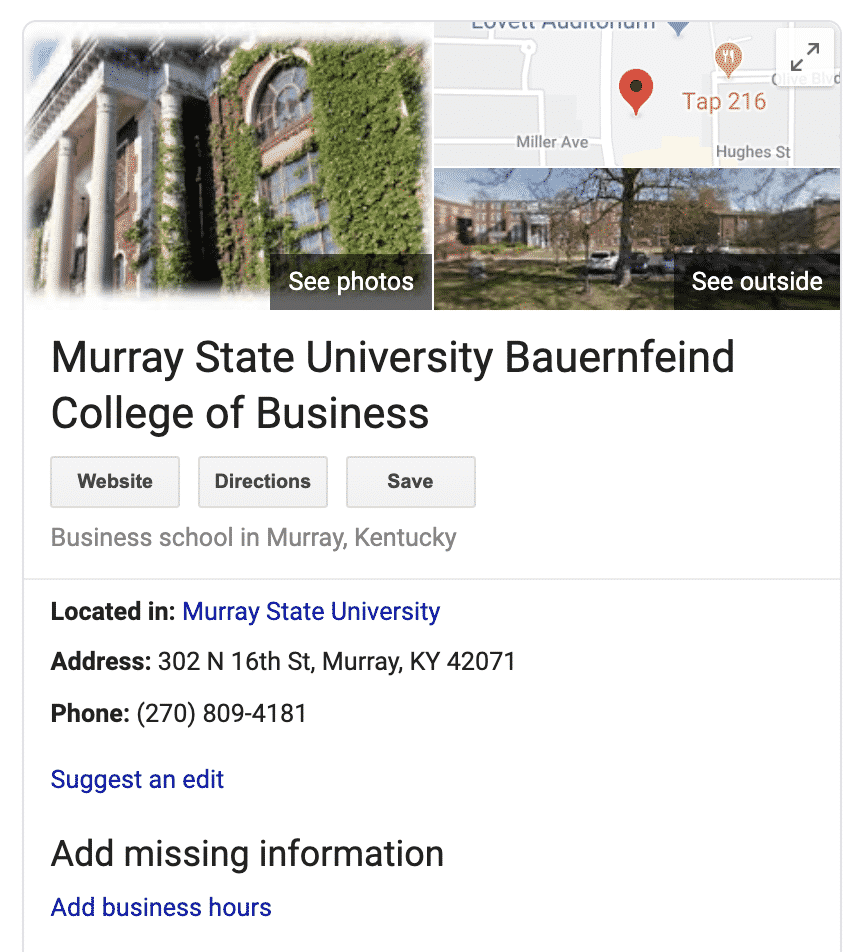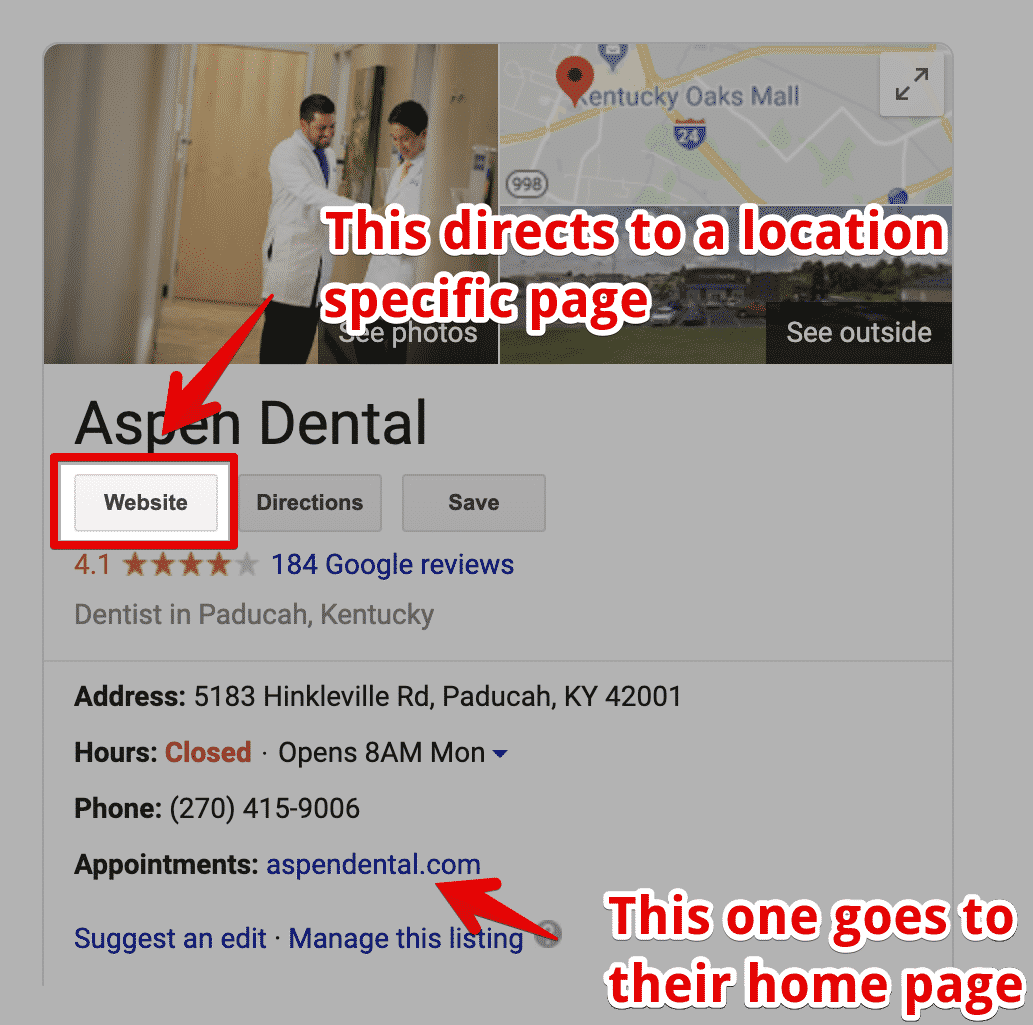What to Include in Your Local Business Listing
Every structured local business listing you set up will require you fill out a specific set of fields that include things like:
[elementor-template id="6569"]
Google, specifically Google My Business, is the leader when it comes to how to set up your listings, so refer to them when looking for best practices. There are a variety of guidelines to follow to represent your business properly, but the key points are:
- Represent your business as it’s consistently represented and recognized in the real world across signage, stationery, and other branding.
- Make sure your address and/or service area is accurate and precise.
- Choose the fewest number of categories it takes to describe your overall core business.
When filling out citations on other sites refer back to the way you have your data structured in Google My Business to keep things consistent.
Before you start creating citations across the web, we’d suggest creating a master spreadsheet to track how and where you’re building them. You’ll then be able to refer back to this spreadsheet anytime you change any of your business information in the future so that you can easily update your listings across the web.
Guidelines and Best Practices for Business Names & Titles on Listings
Use your real-world business name when filling this out. You may have read that including the city name + business name (and vice versa) will help you rank higher and that’s sometimes true. I would caution against this, though.
As of November 2019 Google rolled out a new local search algorithm update that seems to be penalizing GMB listings that do this, causing them to be filtered out in the search results.
Just follow the guidelines and report any businesses you see violating said guidelines. They may benefit from it for the time being but it’s only a matter of time before things catch up to them.
Multi-Location Businesses
Multi-location business are things like chains and franchises. If you manage all of these listings do not add city names or modifiers to the business names on local listings either. Don’t list yourself as something Aspen Dental Chicago or Aspen Dental Cincinnati — just stick to Aspen Dental.
If your legal business name includes the city name (or modifiers) then feel free to add them to your GMB profile. Don’t be surprised if it doesn’t get flagged at some point for review. Be prepared to prove your business name to a Google representative using your filings with the secretary of state or whatever entity is applicable in your given country/state.
It may seem like micromanagement but if you run a set of franchises I would maintain ownership of all GMB listings and grant each franchisee manager status for each. I’ve seen more than one franchise end up with a huge mess to clean up because some enterprising franchisee decided they wanted to violate the guidelines to get an upper hand on the competition.
[elementor-template id="10696"]
Multi-Location Businesses on Facebook
Things are a little different on Facebook. You cannot have more than one listing with the same name so you will need to add a city name or other modifier to differentiate the business listings. Doing so will not, as of January 2020, result in you being penalized.
Businesses with Multi-Practitioners
Some businesses, like law firms, real estate firms, and doctor’s offices consist of multiple professionals within the organization that are each eligible for their own independent business listing.
[elementor-template id="6572"]
When setting up your independent listing do not include the name of the firm as your business name.
Businesses within Other Businesses (Container Locations)
If your business exists inside of another business do not include the container business name in your listing name.

Co-Located Businesses
If your business shares a location with another business in the manner seen by places like WingStreet and PizzaHut then each business should create an independent listing.

Multi-Department Businesses
Some businesses like hospitals and colleges have multiple departments that exist as independent entities operationally. In instances like these it is okay to establish individual listings for each one.
Google’s guidelines state:
- These businesses should be public-facing (e.g. the College of Business within Murray State University is eligible for its own GMB listing but the Accounts Receivable department of a Transportation Carrier would not be).
- The name of the department must be unique from that of the main business.
- It is standard that each of these types of businesses would have their own separate customer service entrances.
- Each department or entity contained within the main entity should have a category set that is separate from that of the main entity.
- Hours may differ from that of the main entity.

Address Guidelines
Use your real-world address without any additions or manufactured alterations. For example, do not add a suite number/letter unless you have in fact set up the addresses with the local post-office as such.
Do not use P.O. Boxes, unstaffed virtual offices (which, if they are staffed they’re really more like satellite offices) nor co-working spaces.
List your street address on the first address line provided by the listing service and add suite numbers or mailbox numbers to the second address line. If only a single address line is provided you may include everything on a single line.
We would recommend you contact the owner of the directory as well and inform them of this limitation of their site.
When in doubt, do your best to use the same format on all listings.
Note on Service Area Businesses
When filling out a GMB listing, Google will prompt you to set a service area and hide your address. You can learn more about this process via our comprehensive Google My Business Guide.
Note that you do not need to hide your address on other directories unless specifically indicated to do so — only on Google.
Keep Phone Numbers Consistent Across Listings
The guidelines recommend that businesses use a phone number with a local area code but they support toll free numbers as well.
If your business generates a lot of customers from outside of the local area, such as a hotel or tourist attraction, then they are useful for anyone who may not have long-distance calling (even though it’s 2020, don’t assume that everyone does).
Whatever route you take, just keep your primary phone number consistent across all of your online listings. You’ll often be able to add additional numbers to your listings as well. These are helpful for things like appointment numbers, special customer support numbers, emergency numbers, and so on.
Website URLs
If you’re going to list a website it needs to go directly there. It should not be a link to a third party (such as a lead gen site) or a social profile. If all you have is a Facebook page we’d encourage you to get a website, even if it’s something basic, set up as soon as possible.
Website URLs for Businesses with Multiple Listings
If your business has multiple locations you should point each location’s listing at its corresponding location/landing page on the site.
For example, if you search for Aspen Dental in different cities you’ll see they have several GMB listings across the U.S. Each listing directs the user to a location specific landing page. This keeps everything hyper-relevant to the searcher and their location.

Some might argue that you should point all of your listings to your homepage to increase your rankings. Our suggestion is to use the location specific page so that a user reaches the page that is most relevant to them. While you may not rank as high, your conversion rate will be better.
Afterall, if you do proper SEO you can increase your rankings without having to rely on the authority your home page has built up.
Categories for Local Businesses
It would be nice if every citation directory used the same categories, but they don’t. Don’t be surprised if you cannot find a category that you feel matches your business.
If you want to really optimize your category listing relative to your competitors, find them on the directory as well and see what categories they’re using.
Regarding Google, it is especially important that you choose the right category. Google recommends that you choose the category that most closely defines your core business.
For example, a personal injury law firm should select the category “personal injury” as opposed to law firm.
Note: Google recommends that you avoid category duplication as well. So do not use both “Personal injury attorney” and “Law firm.”
Descriptions
The description area is a place for you to really explain what your business does and leverage that opportunity to sell yourself. The character count allowed on each of the platforms will vary.
Now, while you can use tools like MozLocal or BrightLocal to get citations updated across multiple platforms at once, what you won’t be able to do is have unique descriptions.
Taking the automatic route saves time and is quite convenient. However, many citations have a hard time staying indexed in Google and if many of your local listings have duplicate descriptions that’s even more reason for Google to filtering them out.
If the description allows you to insert a hyperlink then feel free to. Don’t overdo it though. Your description should be written for people, not machines. A good description may increase the click-through rate. This is where it could pay off to hire a good copywriter.
Tagline
If your business already has a tagline then you can include this if it is an available section for the listing. For example, Aspen Dental uses the tagline simply easier™. If your business doesn’t have one, don’t worry about creating one. It’s there for brand consistency, not ranking.
Social Profiles and their Role in the Knowledge Graph
Link your most important social profiles first. Don’t skip this part either. Google builds a knowledge graph of links and references to you as an entity around the web. The more references you have linked in various locations the clearer it becomes to Google who you are.
Importance of Images for Local SEO
The importance of images cannot be overstated. They can be a major factor on your click-through rates. Regularly upload high-quality images to your GMB listing and upload as many as possible on other listings you create.
Most directories and platforms will allow user-generated content to be uploaded. This can be a great thing but it can impact your brand negatively as well. Keep an eye out on your various listings across the web to make sure no one is tainting your reputation. Pay special attention to your GMB listing as it is the most prominent and be prepared to delete photos posted by others.
Other Information
Other Media
If the platform allows you to upload video and other types of rich media then take advantage of it. Video is especially helpful so don’t be afraid to pull out your phone and record something because that is often better than nothing.
Other types of information you can add include:
- Alternate phone numbers (e.g. appointment numbers, fax numbers, etc.)
- Certifications
- Available brand products you may carry
- Types of payment you accept (e.g. Visa, Cash, Check, etc.)
- Attributes (specific to GMB but include things like veteran led, wheelchair accessible, and more)
Next Steps
Now that you’ve figured out how to set up listings you should be ready to start increasing your presence across the web. If you need more help you can learn how to choose the right category for your business.
If your business already has listings that were created by third-parties then you’ll need to start claiming them so you can control your brand image around the web.

